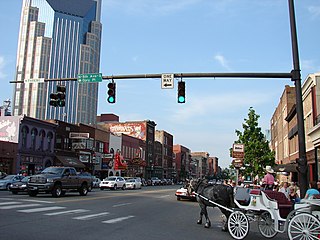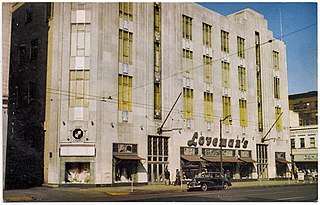
The F. W. Woolworth Company was a retail company and one of the pioneers of the five-and-dime store. It was among the most successful American and international five-and-dime businesses, setting trends and creating the modern retail model that stores follow worldwide today.

The T. Eaton Company Limited, later known as Eaton's and then Eaton, was a Canadian department store chain that was once the largest in the country. It was founded in 1869 in Toronto by Timothy Eaton, an immigrant from what is now Northern Ireland. Eaton's grew to become a retail and social institution in Canada, with stores across the country, buying-offices around the globe, and a mail-order catalog that was found in the homes of most Canadians. A changing economic and retail environment in the late twentieth century, along with mismanagement, culminated in the chain's bankruptcy in 1999.
Antioch is a neighborhood of Nashville located approximately 12 miles (19 km) southeast of Downtown Nashville. It is served by the Metropolitan Government of Nashville and Davidson County.
S. H. Kress & Co. was the trading name of a chain of five and dime retail department stores in the United States established by Samuel Henry Kress. It operated from 1896 to 1981. In the first half of the 20th century, there were Kress stores with ornamented architecture in hundreds of cities and towns.
Hecht's, also known as Hecht Brothers, Hecht Bros. and The Hecht Company, was a large chain of department stores that operated mainly in the mid-Atlantic and southern region of the United States. The firm originated in Baltimore, Maryland.

Madison is a former settlement, now a suburban neighborhood of northeast Nashville, in the U.S. state of Tennessee. It is incorporated as part of the Metropolitan Government of Nashville and Davidson County.
Ohrbach's was a moderate-priced department store with a merchandising focus primarily on clothing and accessories. From its modest start in 1923 until the chain's demise in 1987, Ohrbach's expanded dramatically after World War II, and opened numerous branch locations in the New York and Los Angeles metropolitan areas. Its original flagship store was located on Union Square in New York City. It maintained administrative offices in Newark and in Los Angeles. The retailer closed the Newark offices in the 1970s. Paul László designed the Union Square store as well as many of their other stores.

The Greensboro sit-ins were a series of nonviolent protests in February to July 1960, primarily in the Woolworth store — now the International Civil Rights Center and Museum — in Greensboro, North Carolina, which led to the F. W. Woolworth Company department store chain removing its policy of racial segregation in the Southern United States. While not the first sit-in of the civil rights movement, the Greensboro sit-ins were an instrumental action, and also the best-known sit-ins of the civil rights movement. They are considered a catalyst to the subsequent sit-in movement, in which 70,000 people participated. This sit-in was a contributing factor in the formation of the Student Nonviolent Coordinating Committee (SNCC).

The Nashville sit-ins, which lasted from February 13 to May 10, 1960, were part of a protest to end racial segregation at lunch counters in downtown Nashville, Tennessee. The sit-in campaign, coordinated by the Nashville Student Movement and the Nashville Christian Leadership Council, was notable for its early success and its emphasis on disciplined nonviolence. It was part of a broader sit-in movement that spread across the southern United States in the wake of the Greensboro sit-ins in North Carolina.

The Harris Company was a retail corporation, based in San Bernardino, California, that operated a chain of department stores named Harris', all in Southern California. Philip, Arthur, and Herman Harris – nephews of founder Leopold Harris of what was once the large Los Angeles–based chain Harris & Frank – started the company with a small dry goods store in 1905, and the company eventually grew to nine large department stores, with stores in San Bernardino, Riverside, and Kern Counties.
Blue Boar Cafeterias was a chain of cafeteria-style restaurants based in Louisville, Kentucky. The first Blue Boar was opened in 1931. Once a major presence in metro Louisville, it is still remembered for its old downtown location on Fourth Avenue near Broadway. During the 1930s, Guion (Guyon) Clement Earle (1870–1940) served as advertising manager. He was the brother-in-law of Frank Kennicott Reilly (1863–1932) owner of the Reilly & Lee publishing firm of Chicago. Mr. Earle was well known to the customers of the Blue Boar Restaurant through the witty jottings he created which appeared on the Blue Boar's menus. A decade earlier, Mr. Earle had served as the Superintendent of Loveman, Joseph & Loeb in Birmingham, Alabama, where he published a literary review entitled "The Bookworm".
Britling Cafeterias was a chain of cafeteria-style restaurants, originating in Birmingham, Alabama. During the late 1920s, Britling opened three cafeterias in downtown Birmingham, Alabama. The Britling chain in Memphis, along with B&W Cafeterias in Nashville, Tennessee and Blue Boar Cafeterias in Louisville, Kentucky, were under common ownership in their latter years. All have now closed.

Joske's, founded by German immigrant Julius Joske in 1867, was a department store chain originally based in San Antonio, Texas. In December 1928, Hahn Department Stores acquired the company along with the Titche-Goettinger department store of Dallas, and three years later Hahn became part of Allied Stores. Allied was taken over by Campeau in 1986, and Campeau in turn sold the Joske's chain in 1987 to Dillard's. All Joske's stores were then quickly converted into Dillard's locations.

Halle Brothers Co., commonly referred to as Halle's, was a department store chain based in Cleveland, Ohio. During most of its 91-year history, Halle's focused on higher-end merchandise which it combined with personal service. The company was the first major department store in Cleveland to open a suburban branch store.

Broadway is a major thoroughfare in the downtown area in Nashville, Tennessee. It includes Lower Broadway, an entertainment district renowned for honky tonks and live country music.

Rivergate Mall is a super-regional shopping mall located in Goodlettsville, Tennessee, United States, just outside of Nashville, the state capital of Tennessee. Opened in October 1971, the mall features 1,129,035 square feet (104,890.8 m2) of gross leasable area, with approximately 80 stores and restaurants, as well as a food court. Rivergate Mall has two anchor stores: Dillard's and JCPenney. There are two vacant anchor stores that were formerly Macy's and Sears. Its original anchor stores were Cain-Sloan, Castner Knott, and JCPenney. The mall sits in the core of a shopping district that is shared by the city of Goodlettsville and the Nashville neighborhood of Madison. This area is colloquially referred to by locals as "Rivergate," after the mall. Rivergate Mall is managed by Hendon Properties.
Cain-Sloan Co. Inc. was a department store chain based in Nashville, Tennessee, United States. It was founded in 1903, merged with Allied Stores in 1955, and with Dillard's in 1987. It was a target of the 1960 Nashville sit-ins.

Loveman's of Alabama was a Birmingham, Alabama-based chain of department stores with locations across Alabama. It adopted this name to distinguish it from Loveman's department stores operating in Chattanooga, Tennessee, and in Nashville, Tennessee.

100 Oaks Mall is a shopping mall located three miles south of downtown Nashville, Tennessee along Interstate 65 and Tennessee State Route 155. Neighborhoods and cities around the area include Berry Hill, Woodbine and Oak Hill.
The Dockum Drug Store sit-in was one of the first organized lunch counter sit-ins for the purpose of integrating segregated establishments in the United States. The protest began on July 19, 1958 in downtown Wichita, Kansas, at a Dockum Drug Store, in which protesters would sit at the counter all day until the store closed, ignoring taunts from counter-protesters. The sit-in ended three weeks later when the owner relented and agreed to serve black patrons. Though it wasn't the first sit-in, it is notable for happening before the well known 1960 Greensboro sit-ins.












